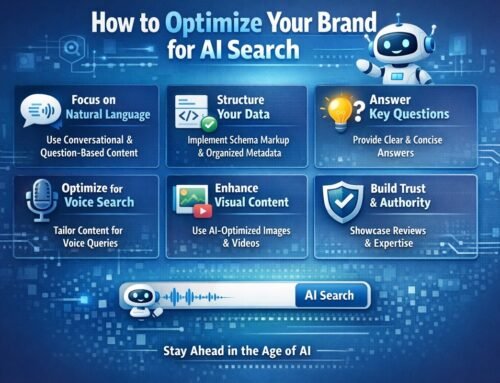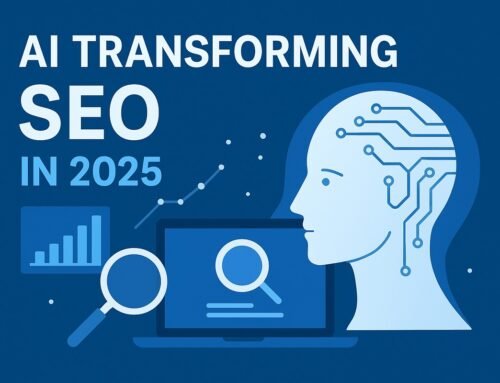Search Engine Optimization (SEO) is evolving faster than ever, thanks to the rapid integration of artificial intelligence. Modern SEO strategies are no longer limited to keywords, backlinks, or traditional content optimization. Today, AI plays a crucial role in understanding user intent, automating complex tasks, analyzing data at scale, and personalizing user experiences. As Google increasingly relies on machine learning systems like RankBrain, BERT, and Search Generative Experience (SGE), businesses must adapt their SEO framework to stay visible and competitive.
To succeed in this AI-driven landscape, brands must build their SEO strategy on strong foundational elements. These elements help deliver high-quality, trustworthy, experience-backed content—aligning with Google’s E-E-A-T (Experience, Expertise, Authoritativeness, Trustworthiness) principles. This article explains the key foundational elements of SEO with AI and how you can integrate them to improve rankings, engagement, and conversions.
Foundational Elements of SEO With AI
Discover the essential elements that shape modern SEO with AI. Learn how AI-powered keyword research, content optimization, technical SEO, personalization, and analytics boost visibility, enhance user experience, and align with Google’s E-E-A-T guidelines for better rankings.
1. AI-Enhanced Keyword Research and Search Intent Understanding
AI tools have transformed how keyword research works. Instead of guessing what users might search for, AI analyzes real-time search patterns, long-tail queries, trends, and semantic relationships. This helps brands create content that genuinely aligns with user needs and search engines’ expectations.
1.1 Semantic Keyword Clustering
AI groups keywords based on meaning instead of exact match terms. This allows you to build content that covers entire topics comprehensively instead of focusing on single keywords.
1.2 Search Intent Classification
AI detects whether users are seeking information, wanting to take action, compare products, or make a purchase. This helps tailor content format and depth accurately.
1.3 SERP Pattern Recognition
AI tools analyze search engine result pages (SERPs) to identify ranking opportunities, featured snippets, “People Also Ask,” and competitor strengths.
1.4 Trend Forecasting
AI predicts rising search trends so you can create content before competition increases.
1.5 Voice & Conversational Query Optimization
AI helps identify voice-search style questions, long natural phrases, and conversational semantics essential for smart assistant optimization.
2. AI-Powered Content Creation & Optimization
AI supports the creation of optimized, structured, and topic-rich content. While human expertise provides authenticity and E-E-A-T, AI enhances quality and scalability.
2.1 Topic Gap Analysis
AI scans top-ranking content and identifies missing elements in your existing content or opportunities to create new sections.
2.2 Content Scoring Using Algorithms
Platforms like Surfer, Clearscope, and MarketMuse use NLP to evaluate content depth, readability, keyword usage, and topical authority.
2.3 Content Personalization
AI adjusts content based on user behavior, location, and preferences to improve engagement and dwell time.
2.4 Automated Meta Tags & Schema
AI generates SEO-optimized titles, meta descriptions, and structured data, improving visibility in SERPs.
2.5 E-E-A-T Enhancement Tools
AI tools scan for factual accuracy, tone consistency, author credibility, and citation quality to ensure content meets Google’s trust standards.
3. Technical SEO With AI-Driven Precision
Technical SEO ensures search engines can crawl, understand, and rank your website. AI tools now automate many complex processes, speeding up diagnosis and optimization.
3.1 AI-Based Crawl Analysis
AI-powered crawlers detect broken links, missing tags, crawl errors, slow pages, and indexation issues faster than manual audits.
3.2 Page Speed Optimization
AI suggests ways to reduce loading time, such as optimizing scripts, compressing images, and improving hosting performance.
3.3 Log File Analysis
AI tools analyze server logs to identify Googlebot behavior, crawl patterns, and indexing challenges.
3.4 Core Web Vitals Monitoring
AI monitors CLS, LCP, FID, and user experience data over time and highlights exact changes needed.
3.5 Structured Data Automation
AI generates and validates schema markup automatically, boosting eligibility for rich results.
4. AI-Driven Content Experience & Personalization
User experience is a critical ranking factor, and AI helps tailor website interactions that keep users engaged.
4.1 Predictive UX Optimization
AI predicts user behavior and suggests UX improvements based on heatmaps, click patterns, and session recordings.
4.2 Personal Content Recommendations
Just like Netflix and Amazon, websites can use AI to recommend articles, products, or services for each visitor.
4.3 AI Chatbots for Engagement
AI chatbots enhance user engagement and reduce bounce rates by providing instant support and interactive experiences.
4.4 Dynamic Page Optimization
AI customizes landing pages based on device, user type, or referral source.
4.5 Improved Conversion Pathways
By understanding user behavior, AI helps build streamlined sales funnels that increase conversions.
5. AI-Enhanced Link Building & Authority Growth
Backlinks remain one of the strongest ranking signals. AI strengthens link-building strategies through faster research and outreach automation.
5.1 Smart Prospect Identification
AI identifies the most relevant and high-authority websites for backlinks based on niche relevance and ranking potential.
5.2 Competitor Backlink Analysis
AI scans competitor backlink profiles and highlights opportunities to replicate or outperform their strategies.
5.3 Automated Outreach Personalization
AI writes personalized email templates that improve response rates.
5.4 Toxic Link Detection
AI identifies harmful backlinks and helps with disavow recommendations.
5.5 Digital PR Intelligence
AI tools discover trending stories, journalist contact details, and real-time PR opportunities to earn high-quality links.
6. AI for Analytics, Reporting, and Performance Measurement
AI improves SEO reporting accuracy by automatically detecting patterns and providing actionable insights.
6.1 Predictive Traffic Modeling
AI forecasts future traffic trends based on historical data and algorithm patterns.
6.2 Automated Performance Alerts
AI tools notify you about ranking drops, traffic fluctuations, or broken pages instantly.
6.3 SERP Volatility Tracking
AI monitors algorithm updates and analyzes how changes impact your website’s rankings.
6.4 Audience Behavior Insights
AI segments users based on behavior, intent, device, geography, and conversion probability.
6.5 ROI & Conversion Optimization
AI correlates SEO actions with conversions, helping businesses fine-tune strategies for maximum revenue.
Conclusion
SEO with AI is the future of digital visibility. By adopting AI-driven tools and integrating them with strong E-E-A-T principles, businesses can create more accurate, trustworthy, and user-focused content. The foundational elements—AI-based keyword research, personalization, technical optimization, authority building, and data-driven analytics—help brands stay ahead in an increasingly competitive market. AI empowers SEO teams to work faster, smarter, and more strategically, ensuring long-term organic growth.
When human expertise meets AI-generated insights, SEO becomes not just a marketing tactic but a powerful business engine.
FAQ
Why is AI essential for modern SEO?
AI helps analyze large amounts of data, understand user intent, optimize content, and automate repetitive tasks, making SEO more accurate and efficient.
Does AI replace human SEO experts?
No. AI enhances human expertise. SEO still requires human strategy, creativity, E-E-A-T, and decision-making.
How does AI improve content quality?
AI tools offer data-based suggestions, semantic optimization, readability improvements, and structure recommendations that elevate content quality.
Can AI help with backlink building?
Yes. AI identifies prospects, analyzes competitor links, detects toxic backlinks, and automates outreach, making link building faster and more effective.
What is the role of E-E-A-T in AI-powered SEO?
E-E-A-T ensures content remains accurate, trustworthy, and expert-level, even when created with AI assistance. It boosts credibility and ranking potential.




